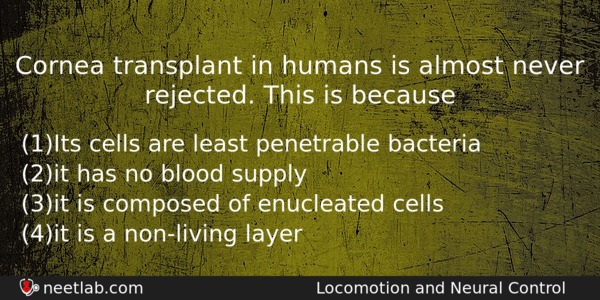| ⇦ | 
| ⇨ |
Cornea transplant in humans is almost never rejected. This is because
Options
(a) Its cells are least penetrable by bacteria
(b) it has no blood supply
(c) it is composed of enucleated cells
(d) it is a non-living layer
Correct Answer:
it has no blood supply
Explanation:
Cornea transplant in humans is almost never rejected. This is because it has no blood supply. Cornea is a transparent layer of tissue, continuous with the sclerotic, that forms the front part of the vertebrate eye, over the iris and lens.
Related Questions: - Bacterial flagella is made up of
- In which of the following interactions both partners are adversely affected ?
- Asexual reproduction in Hydra occurs in
- Test cross is a cross in between hybrid and
- Which is the particular type of drug that is obtained from the plant
Topics: Locomotion and Neural Control
(33)
Subject: Biology
(4253)
Important MCQs Based on Medical Entrance Examinations To Improve Your NEET Score
- Bacterial flagella is made up of
- In which of the following interactions both partners are adversely affected ?
- Asexual reproduction in Hydra occurs in
- Test cross is a cross in between hybrid and
- Which is the particular type of drug that is obtained from the plant
Topics: Locomotion and Neural Control (33)
Subject: Biology (4253)
Important MCQs Based on Medical Entrance Examinations To Improve Your NEET Score
18000+ students are using NEETLab to improve their score. What about you?
Solve Previous Year MCQs, Mock Tests, Topicwise Practice Tests, Identify Weak Topics, Formula Flash cards and much more is available in NEETLab Android App to improve your NEET score.
Share this page with your friends

Leave a Reply